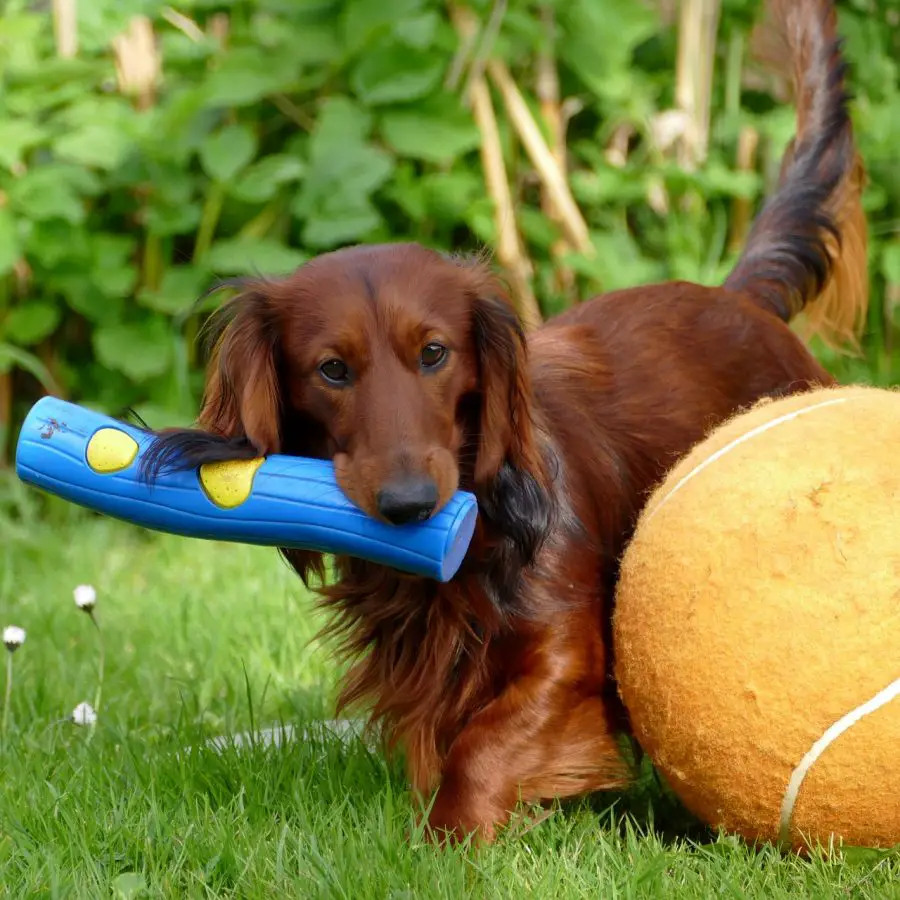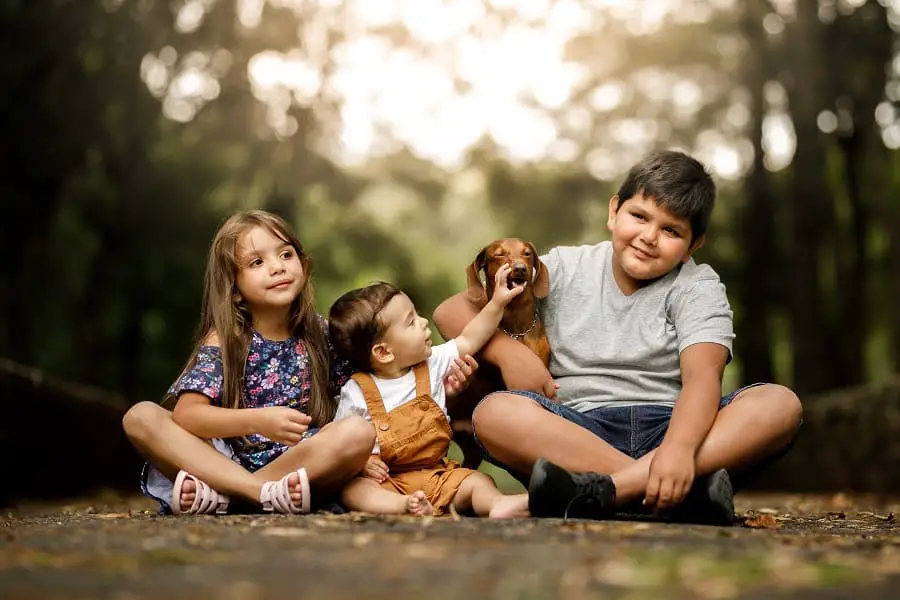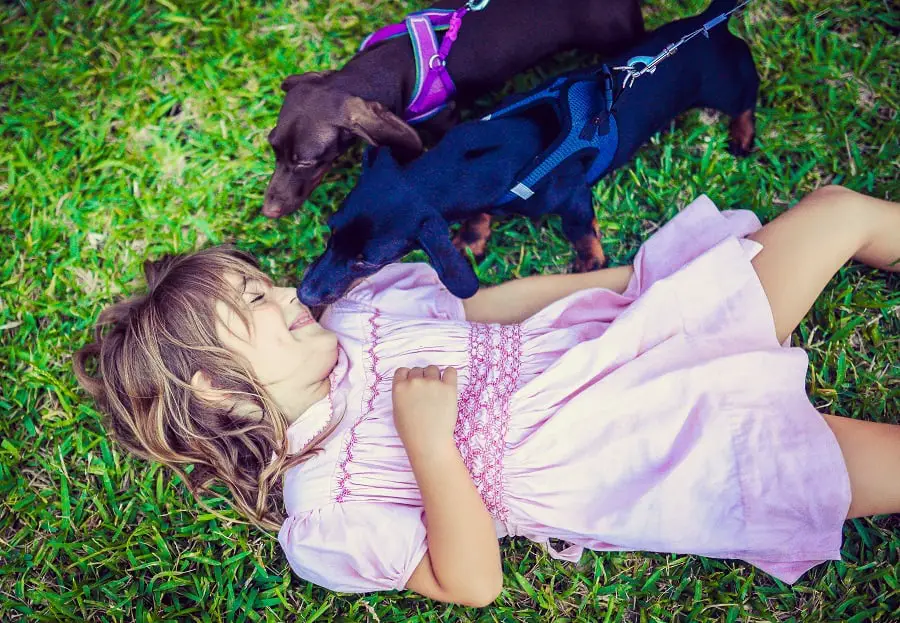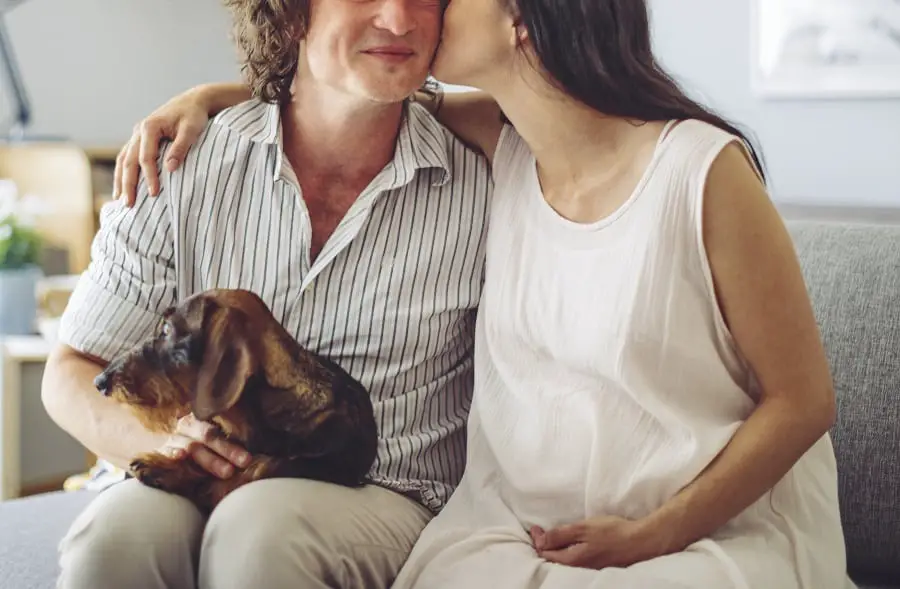Dogs are a beautiful addition to any family and especially for small children.
A child who has a dog learns about compassion and empathy, it helps fosters their self-esteem, promotes physical activity and provides the child with an endless love for all living creatures.
Dachshunds are wonderful dogs and make stellar companions. They are affectionate and love to be the center of attention.
But a big question, is if they are good with young children and babies.
A lot of people think that just because dachshunds are small dogs, that it automatically makes them get along well with children and babies.
In general, this is the case, but of course, each dachshund is different.

Most dachshunds are playful with a good sense of humour and a great loyalty to their family.
However, due to their stubborn nature they can also be irritable and cranky at times, causing them to occasionally snap.
Temperament of a dachshund
Similar to terriers, the dachshund loves to join in on everything and they certainly don’t let their size get in the way of anything!
They are sharp and alert, lively and charming. Their short, loud bark makes them great little watch dogs; however, they don’t usually take too well to complete strangers.
Their stubbornness places them high on the list of dogs that are challenging to house train (though, of course, it can be done!), but their loyalty to their owners makes up for it.
They like to be homed with another dachshund, but also behave quite well by themselves.
A negative trait they tend to have is jealousy and possessiveness and this should be nipped in the bud from the very beginning, otherwise they develop bad habits which can be hard to break later on.
Overall, the temperament of a dachshund is affected by their training, socialisation and heredity, meaning that if you train your dog well, they should be a loving and peaceful member of the family.
Dachshunds with children
A lot of families want to know if dachshund’s will be a suitable family member for their children and the short answer is: yes.
However, just with any breed of dog, it largely depends on the dog itself.

In general, dachshunds are quite tolerant of lots of pats and cuddles and are usually quite relaxed around running and screaming kids.
As said above, dachshunds don’t usually take well to strangers, so always make sure you introduce your children’s friends to your dog properly.
Another important factor as to whether a dachshund will be good with young children or not is the history of the dog.
If you have adopted them as an adult, perhaps they have had a traumatic incident occur in their past with a child.
If this is the case, they won’t take too kindly to a screaming child running at them, but this is the situation with any breed of dog.
Teach your children how to interact with your dachshund
It is extremely important that you teach your children the rules of how to handle and interact with the family dachshund.
Due to the long back of a dachshund, they need to be handled with care. It is important that your children know this and know how to correctly handle him.
It is a good idea to make a rule that your young kids can only hold him when they are sitting on the floor.
If they are squeezing or hugging him too tightly, this can damage his back, resulting in devastating consequences.
Make sure your children never tug on his tail and ears and tell them never to approach him when he’s sleeping or eating.
Even though it is likely your dachshund will respond well to children in the family, never have the mentality that ‘my kids can do whatever they want to my dog and he will never react’.
Because occasionally, a dog can lose their temper and snap, even biting whoever is nearby.
Introducing your children to your dachshund
The best time to introduce your dachshund to your children is when the dachshund is a puppy.
When the puppy arrives home, sit down with him and your children and have a gentle petting session.

Let your puppy sniff your kids and let them both know that neither are a threat to the other.
Over time, your pup will learn that the kids are his family and he will be gentle and peaceful with them.
Just as dogs have a pecking order in a pack, they also have this same system in their family of humans.
It is important to teach pup early on that he is at the bottom of the pecking order and that the kids are above him.
Dachshunds like to assert their dominance, especially on children, so always make sure you tell him a firm ‘no!’ if he tries to do so.
Signs your dachshund wants a child to back off
While your dachshund is quite patient by nature, there may be times where the dog is feeling overwhelmed, scared or irritated by loud, screaming children.
These are the signs to watch for and teach your kids if your dachshund wants some space:
-A low growl
-Baring of his teeth
-Retreating into himself
-Cowering
-Shaking
-Tail between his legs
-Avoids the child
-Pacing
-Tongue flick
-Pulled back ears
Whale eye (turning head away from what he is watching but keeping one eye on it, so you can see the white part of the eye).
Expecting a baby in the family
As mentioned earlier, dachshunds can be jealous dogs and don’t like it when they are not the centre of attention.
If a baby is about to be born, this could trigger jealousy in your dog.
The best way to ensure your pooch doesn’t become a green-eyed monster is by continuing to give him his appropriate share of attention when the baby does come along.

Your dog will quickly accept that the baby is a part of the family and may even start to show signs of protectiveness over the newborn.
Before the baby is brought home, review your dog’s training and make sure they can sit, lie and stand on command even when you yourself are sitting or lounging around.
If your dachshund hasn’t been around many children before, get him used to that before the baby is born.
Socialize him in a positive and controlled environment with kids and learn your dog’s sensitivities.
When the baby comes along, the feeding and exercise times for your dog will most likely change. Begin this varied schedule a few months beforehand so he used to it.
It is a good idea to play music or an audio that has baby noises on it so your pooch is prepared for the noises of the real baby and recognizes it.
Once the baby is born, have dad come home with the baby’s blanket so your dachshund can get used to his or her smell.
Never leave your baby alone with your dog, as they can sometimes pick them up and carry them in their mouths or become agitated by a crying baby.
Always avoid face-to-face contact with your dog and your baby and if your dog is around, don’t leave your baby on the floor.
Ensure the dog has a safe place (like a crate) to retreat to and ensure he is getting at least 20 minutes of exercise each day, even if that means you have to hire a dog walker.
Don’t punish your dachshund if he growls at small children
As mentioned above, growling is one of the signs that your dog is feeling scared, overwhelmed or annoyed by someone or something.
It is important not to punish your dachshund if he growls at a child who is close to them, as it is his warning sign that the child needs to back off.
If you punish him for this, he may learn not to growl and instead skip the warning sign and bite or snap at the child straight away.
Respect the growl and summon your children to move away or gently guide the dog somewhere else.
Having a dog as a family member should be a happy and safe experience.
If at any time, you feel that your dog has behavior issues or is displaying any aggressive signs, it is important that you take your dog straight to your local vet, as there could be something medically wrong with him rather than just being ‘angry’.
If he seems to be healthy, your vet can pass you on to an experienced dog trainer who can help your dog become a more social and happier canine.
